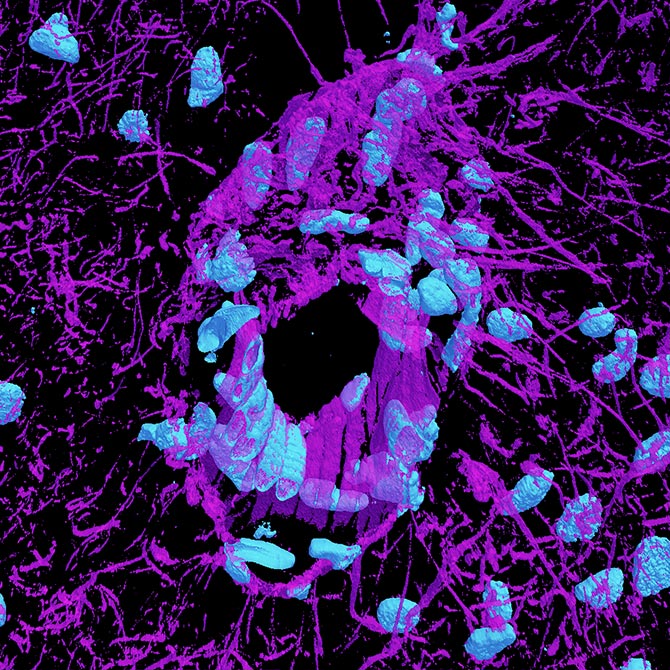December 13, 2021
The McKnight Endowment Fund for Neuroscience has selected four projects to receive the 2022 Neurobiology of Brain Disorders Awards. The awards will total $1.2 million over three years for research on the biology of brain diseases, with each project receiving $300,000 between 2022 and 2025.
The Neurobiology of Brain Disorders (NBD) Awards support innovative research by U.S. scientists who are studying neurological and psychiatric diseases. The awards encourage collaboration between basic and clinical neuroscience to translate laboratory discoveries about the brain and nervous system into diagnoses and therapies to improve human health.
“It’s exciting to have the opportunity to select some of the nation’s leading neuroscientists and to support their trailblazing research,” said Ming Guo, M.D., Ph.D., chair of the award committee of the Neurobiology of the Brain Disorders, Professor in Neurology & Pharmacology at UCLA David Geffen School of Medicine and Director of Aging Center at UCLA. “This year’s awardees are conducting research into disease and conditions that affect millions of patients. Their work focuses on breathing problems and brain circuit, drug addiction, the gut-brain interactions underlying anorexia, and hedonic eating behavior and obesity. By understanding the neurobiology of diseases, we open the door to new ways to prevent and treat these brain disorders.”
The awards are inspired by the interests of William L. McKnight, who founded the McKnight Foundation in 1953 and wanted to support research on brain disease. His daughter, Virginia McKnight Binger, and the McKnight Foundation board established the McKnight neuroscience program in his honor in 1977.
Multiple awards are given each year. This year’s four awardees are:
- Lisa Beutler, M.D., Ph.D., Assistant Professor of Medicine in Endocrinology, Feinberg School of Medicine, Northwestern University, Chicago, IL
Dissecting the gut-brain dynamics underlying anorexia: Dr. Beutler seeks to document the gut-brain neural circuits affected in inflammation-mediated anorexia, identify what causes the disruption of those circuits, and discover neural substrates that can help overcome the condition. - Jeremy Day, Ph.D., Associate Professor, Department of Neurobiology, Heersink School of Medicine, University of Alabama – Birmingham; and Ian Maze, Ph.D., Professor – Departments of Neuroscience and Pharmacological Sciences, Director – Center for Neural Epigenome Engineering, Icahn School of Medicine at Mount Sinai, New York City
Leveraging single-cell epigenomics for targeted manipulation of drug-activated ensembles: Drs. Day and Maze are researching the epigenetic underpinnings of addiction, identifying neural ensembles that have been hijacked by drug exposures, thereby disposing individuals to relapse. - Stephan Lammel, Ph.D., Associate Professor of Neurobiology, University of California – Berkeley
Neurotensin mediated regulation of hedonic feeding behavior and obesity: Dr. Lammel’s work focuses on the neural processes and brain regions involved in excessive feeding behavior in the presence of calorie-dense food and its regulation. - Lindsay Schwarz, Ph.D., Assistant Professor in Developmental Neurobiology, St. Jude Children’s Research Hospital, Memphis, TN
Identifying brain circuits that connect respiration and cognitive state: Dr. Schwarz aims to identify which breathing-related neurons are selectively activated by physiological and cognitive cues and map the brain regions they connect with.
With 106 letters of intent received this year, the awards are highly competitive. A committee of distinguished scientists reviews the letters and invites a select few researchers to submit full proposals. In addition to Dr. Guo, the committee includes Sue Ackerman, Ph.D., University of California, San Diego; Susanne Ahmari, M.D., Ph.D., University of Pittsburgh School of Medicine; Robert Edwards, M.D., University of California, San Francisco; Andre´ Fenton, Ph.D., New York University; Tom Lloyd, M.D., Ph.D., Johns Hopkins Medical School; and Harry Orr, Ph.D., University of MN.
2023 awards update: The submission and selection schedule for the Neurobiology of Brain Disorders Awards is changing. The deadline for Letters of Intent for the 2023 awards will be announced in mid-2022.
ስለ McKnight የተፈ ሰጭ ገንዘብ ለኒውሮሳይንስ ፈንድ
የ McKnight Endowment Fund ፎርኒቫይሳይቨን በሜኒንፖሊስ, ሚኔሶታ ውስጥ በሚክክኝንት ፋውንዴሽን ብቻ የተደገፈ እና በሀገሪቱ ውስጥ ባሉ ታዋቂ የነርቭ ሳይንቲስቶች አማካይነት ይመራ ነበር. የ McKnight ተቋም ከ 1977 ዓ.ም ጀምሮ የነርቭ ሳይንስ ምርምርን አጉልቷል. ፋውንዴሽን በ 3 ዎቹ ካምፓኒዎች ቀደምት መሪዎች ከሆኑት ከዊሊየም ማክኪንሰን (1887-1978) አንዱን ዓላማ ለማከናወን ፋውንዴሽን የመዋጮ ፈንድ እ.ኤ.አ. 1986 አቋቋመ.
The Endowment Fund makes three types of awards each year. In addition to the Neurobiology of Brain Disorders Awards, they are the McKnight Technological Innovations in Neuroscience Awards, providing seed money to develop technical inventions to advance brain research; and the McKnight Scholar Awards, supporting neuroscientists in the early stages of their research careers.
Bios
Lisa Beutler, M.D., Ph.D., Assistant Professor of Medicine in Endocrinology, Feinberg School of Medicine, Northwestern University, Chicago, IL
Dissecting the gut-brain dynamics underlying anorexia
Feeding is at the very core of an animal’s survival, so it’s no surprise that the gut and brain are in constant communication to coordinate appropriate food intake and stable bodyweight. However, in the presence of inflammation, this system may break down. One of the hallmarks of inflammation-associated anorexia (not to be confused with anorexia nervosa) is decreased appetite, which can be severe enough to cause malnutrition. Current therapies – including IV-delivered nutrition and intestinal feeding tubes – can reduce quality of life and have significant collateral consequences.
Dr. Beutler aims to use advanced neural observation and manipulation techniques to dissect the underlying mechanisms involved in inflammation-associated anorexia. Beutler’s team will use calcium imaging to reveal the effects individual cytokines (signals released during inflammation) have on specific groups of feeding-related neurons. Her group will also use cutting-edge genetic tools to try to override the inappropriate ‘don’t eat’ signals that result from severe inflammation. Finally, she will study how specific models of inflammatory disease change the neural response to nutrient intake.
Beutler’s research will be the first to study these specific processes at this level of detail in a living organism. By identifying precise neurological targets of cytokine release, and deciphering how this modulates appetite, Beutler hopes to identify therapeutic targets for malnutrition associated with inflammatory diseases. Moreover, her lab aims to create a road map of gut-brain-immune signaling that may have major implications not only for treating inflammation-mediated anorexia, but broadly for future feeding and metabolism research.
Jeremy Day, Ph.D., Associate Professor, Department of Neurobiology, Heersink School of Medicine, University of Alabama – Birmingham; and Ian Maze, Ph.D., Professor – Departments of Neuroscience and Pharmacological Sciences, Director – Center for Neural Epigenome Engineering, Icahn School of Medicine at Mount Sinai, New York City
Leveraging single-cell epigenomics for targeted manipulation of drug-activated ensembles
Drug addiction is a serious problem both for individuals and society as a whole. While there has been significant research into understanding and treating addiction, 60% of those treated will suffer a relapse. In fact, the craving for drugs may actually increase over time, incubating in those who have been addicted even without further drug exposures. Dr. Day and Dr. Maze aim to research addiction at a new level – drilling down to the epigenetic effects of drug use on specific cells at a single-cell level, and how these may predispose a subject to a relapse.
Preliminary research has shown that exposure to drugs over time alters how genes are expressed. In essence, drugs can hijack genetic regulatory elements known as “enhancers,” which when activated cause certain genes to be expressed in brain cells that motivate the subject to seek out these drugs. Day and Maze have designed a project to identify these enhancers in a cell-type specific fashion that are activated (or unsilenced) by cocaine – a well understood and researched stimulant – and then create and insert viral vectors into cells that will only become active in the presence of that unsilenced enhancer. Using this strategy, the viral vector will express its cargo only in cell ensembles that are affected by cocaine and allow researchers to optogenetically or chemogenetically activate or deactivate the affected cells.
With this, Day and Maze will perturb the ensembles to investigate their effects on drug seeking behavior in a rodent model of volitional cocaine self-administration. Their work builds on recent advances in the ability to target individual cells and small groups of cells, rather than entire populations of cells or cell types as has been the focus of earlier research. Now that it is possible to focus on the role specific cells play, the hope is that better treatments may be developed that address the genetic roots of addiction and relapse, and without the negative side effects of manipulating larger, less targeted populations of brain cells.
Stephan Lammel, Ph.D., Associate Professor of Neurobiology, University of California – Berkeley
Neurotensin mediated regulation of hedonic feeding behavior and obesity
The brain is obsessed with finding and consuming food. When calorie-dense food is found – rare in the wild – animals will instinctively consume it rapidly. For humans with ready access to calorie-dense food, the instinct sometimes leads to overeating, obesity, and related health issues. But research has also shown that in some cases, the drive to feed on high-calorie food may diminish when such food is always available. Dr. Lammel seeks to identify the neural processes and brain regions involved in such feeding behavior and its regulation.
Studies over the years have linked feeding to the hypothalamus, an ancient and deep part of the brain. However, evidence also points to a role for the reward and pleasure centers of the brain. Lammel’s preliminary research found that links from the lateral nucleus accumbens (NAcLat) to the ventral tegmental area (VTA) are central to hedonistic feeding – activating that link optogenetically led to increased feeding of calorie-rich foods, but not regular food. Other research identified the amino acid neurotensin (NTS) as a player in the regulation of feeding, in addition to other roles.
Lammel’s research seeks to map out the circuitry and roles of the various parts of the brain that lead animals to eat hedonistically as well as the role of NTS, which is expressed in the NAcLat. Subjects are presented with a normal diet or a calorie-rich jelly diet, and activity on the NAcLat-to-VTA pathway is recorded and mapped to feeding behaviors. He will also track changes over time with prolonged exposure to hedonistic food. Further research will look at changes in NTS presence in cells, and how its presence in different amounts affects cell function. By understanding the pathways and molecular mechanics involved in feeding and obesity, this work may contribute to future efforts help manage obesity.
Lindsay Schwarz, Ph.D., Assistant Professor in Developmental Neurobiology, St. Jude Children’s Research Hospital, Memphis, TN
Identifying brain circuits that connect respiration and cognitive state
Breathing is automatic in animals, but unlike other comparably essential functions – heartbeat, digestion, etc. – animals can consciously control breathing. Breathing is also tied to emotional and mental state in a two-way manner: emotional triggers can cause changes in breathing, but consciously changing breathing has also been shown to influence state of mind. In her research, Dr. Schwarz aims to identify which breathing-related neurons are selectively activated by physiological and cognitive cues and map the brain regions they connect with. This research may prove helpful in studying a variety of neurological disorders where breathing is impacted, such as sudden infant death syndrome (SIDS), central sleep apnea, and anxiety disorders.
Schwarz aims to take advantage of advances in neural tagging to study these neurons which, located deep in the brain stem, have traditionally been difficult to isolate and record in vivo. But with activity tagging, Schwarz can identify the neurons activated during innate vs. active respiration. For the latter, subjects are conditioned to a stressful stimulus that causes them to freeze and alter their breathing. Researchers then can examine the tagged neurons to identify which were active in the conditioned subjects, and address whether these overlap with neurons active during innate respiration.
A second aim is to identify the molecular identity of the breathing-related neurons that were activated during conditioning to more precisely understand which cells are part of the breathing circuit. Finally, having identified those neurons, Schwarz will use viral vector approaches developed by other researchers to determine what parts of the brain those activated cells connect to. Identifying the links between brain states and breathing, the overlap of conscious and unconscious breathing circuits, and the connection between breathing and certain diseases may lay the groundwork for better therapies as well as a fuller understanding of how our most fundamental functions are wired.


